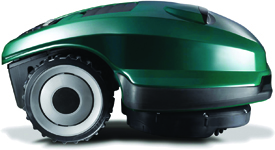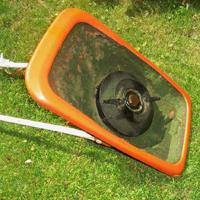Growing season is here and the iconic noises are back: birds chirping, bees buzzing, and lawn mowers running.
Now is the time to get your mower back into shape with some routine maintenance and blade sharpening. We’ve compiled a list of 7 different types of lawn mowers on the market.
Reel Mowers
This is where it all began for lawn mowers. Reel mowers (also sometimes referred to as cylinder mowers) are likely the vision you have in your head of people cutting their grass in the 1950s. Typically, a reel mower is a manual push mower with a cylinder of exposed blades at the front.
Reel mowers were one of the first types of lawn mowers created, but don’t mistake them as outdated or obsolete. Technology has improved, especially over the past decade, making newer models easier to push. They are not only the most environmentally friendly option, but they also eliminate the need for gas, and give your lawn one of the best cuts!
Reel mowers cut grass in a scissor-like action between two cutting surfaces. There’s the rotating cylinder of blades, and there’s also a stationary blade that that cylinder rotates very close to. As you push a reel mower across a lawn, the motion of the reel draws grass blades up and between the cylinder and the stationary blade—that’s where the cutting occurs, just like scissors.
Rotary Mowers
Rotary mowers, on the other hand, cut grass with a single blade that rotates more like a weed whacker or the blades of a helicopter. The single blade makes contact with individual blades of grass from the slide when it cuts them, rather than trapping them between two cutting surfaces like a reel mower.
This rotary principle is how most mowers marketed for use on residential lawns function. Think of someone pulling a cord to start up their mower and then walking along with what looks somewhat like a go-cart in front of them. That’s the kind of lawn mower most homeowners are probably familiar with.
When it gets down to it, all lawn mowers, broadly speaking, are either reel or rotary.
Robot Lawn Mowers

Yes, you read correctly—robots. You may have seen robotic vacuums, but have you seen the same technology applied to mowers? Not only would a robotic mower save you money, but an electric model (shown above) can also reduce your carbon footprint.
High-Speed Lawn Mowers
The fastest lawn mower set a world record of 116.57 mph. This, of course, isn’t a showroom model but it is still cool. We don’t recommend that you mow your lawn at high speeds, but if you’re into lawn mower racing, now you know how fast you will need to go.
Animals
Want to go all-natural? Employ an animal! Goats are usually the go-to choice, but they don’t discriminate with regards to what plants they eat—buyer beware. Cows, geese, chickens, sheep, or even guinea pigs will happily chow down on your lawn. Each offers its own pros and cons so do your research before taking on this responsibility.
Hover-Mowers

It’s real. The lawn mower blade acts as the "lift" for the mower itself creating a hovering effect. We’ve heard mixed reviews on their overall effectiveness, but we think they’re still groovy. These mowers are fairly inexpensive due to the reduced amount of material they require in production.
Remote-Controlled Mowers
Because sitting on the lawn mower just wasn’t comfortable enough; someone went ahead and made a remote-controlled lawn mower. It’s true!
Rechargeable Lawn Mowers
Battery-powered lawn mowers such as the ones offered by GreenworksTools.com are now as effective and efficient as gas-powered mowers with the added benefit of reducing air and noise pollution in addition to saving money otherwise spent on gas.
Regardless of how you choose to mow your lawn, it is important to practice proper mowing techniques to maximize the results of your Nature's Lawn® fertilization program. And don’t make these common lawn care mistakes. For more tips, call a local NaturaLawn® of America franchise today to care for your lawn.






